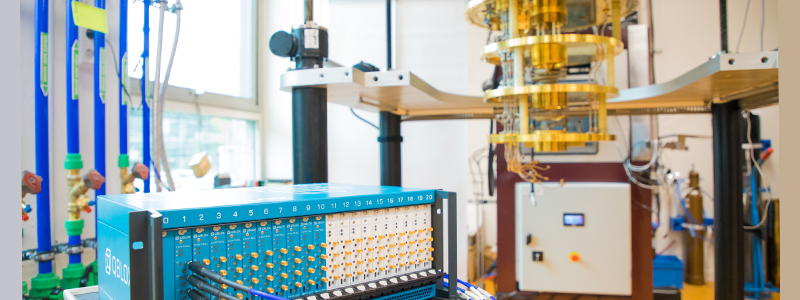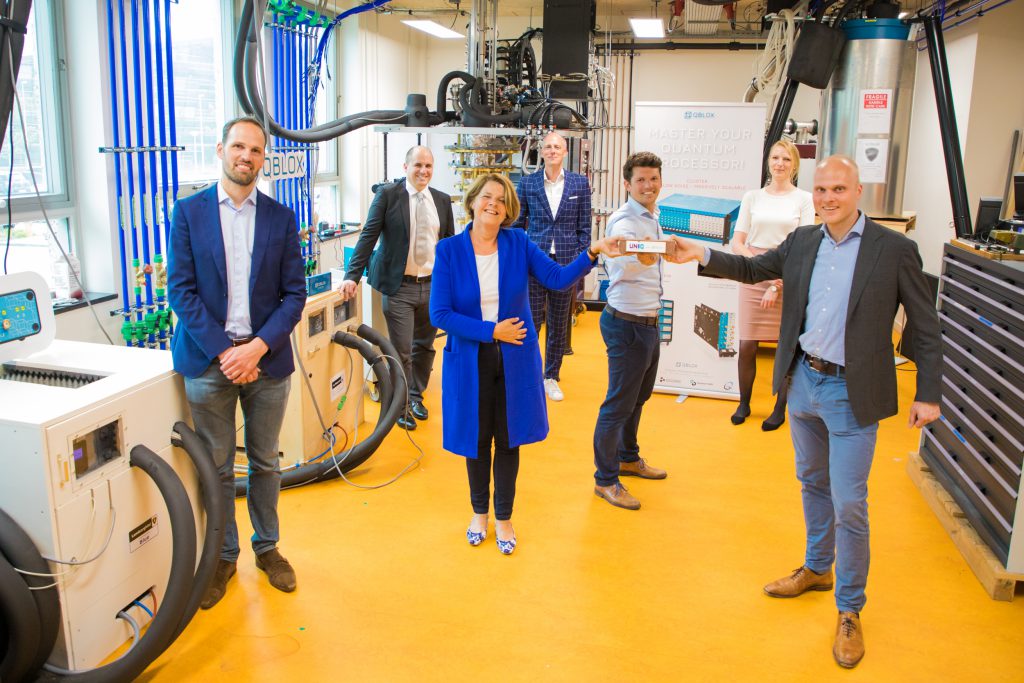08.07.2020Awards
QuTech spin-off QBlox receives UNIIQ-investment to enhance quantum computing’s scalability

QuTech spin-off QBlox receives UNIIQ-investment to enhance quantum computing’s scalability
Across the globe, quantum computing is looked upon as the next step in computing. Before quantum computers can live up to this promise, several crucial steps in their development must be made. One of those steps involves the development of an accurate and scalable control system, allowing to control hundreds or even thousands of qubits at a time. The Delft-based company Qblox has made it their mission to develop extremely scalable and modular control systems for exactly this purpose. To further develop their technology and to reach a broader market, Qblox has received an investment of proof-of-concept fund UNIIQ. The investment was announced by the Mayor of the City of Delft, Marja van Bijsterveldt, during a working visit to Qblox.
Classical computing is nearing its limit
The personal computer as we know it, is perfectly capable of solving most of our day-to-day problems. However, when the size of demanding problems presented to a personal computer increases, the required calculation time to solve these increases quickly, and rapidly approaches infinity. These now unsolvable problems cover a wide range of societal paramount topics: from the discovery of new materials and medicine, to the optimization of logistics. This is where quantum computing comes in.
Quantumbits or ‘qubits’ instead of normal bits
Quantum computers process their information on quantum bits or ‘qubits’ for short, instead of on normal computing bits. Contrary to normal computers, qubits can hold more information at a time. Moreover quantum computers can process information in parallel. These fundamental differences enable the quantum computer in theory to solve many complex problems within reasonable time. To make quantum computers practically possible though, all parts of the quantum computer must be improved along the way. For instance, the heart of the system now harbours a suboptimal setup of various measure- and control devices: this is the quantum control stack, responsible for activating and controlling the qubits. Faulty communication between the various devices making up the control stack makes the system error prone, slow to set up and hard to scale. Today’s control stacks are part of the reason that quantum computing is still limited in terms of scalability and therefore in processing power.
 UNIIQ-investment in Qblox announced by Marja van Bijsterveldt. Credit: Daniel Verkijk
UNIIQ-investment in Qblox announced by Marja van Bijsterveldt. Credit: Daniel VerkijkQblox simplifies and optimizes the quantum control stack with its Pulsar and Cluster Modules
In their day-to-day work in quantum research, Qblox founders Niels Bultink and Jules van Oven were often confronted with the limitations of the current control stack. Both founders were employed by QuTech, one of the leading quantum research institutions of the world, and the birth ground of Qblox’ technology. Qblox is the first of many QuTech spin-offs, as the institute aims to enable commercialization of quantum research within the Quantum Delft ecosystem.
The UNIIQ investment is used to further develop, test and refine the Qblox control stacks, and to launch their Pulsar and Cluster modules on a broader market. Qblox’s technology makes the work of quantum researchers easier and forms an important step towards scaling up the number of qubits in a quantum computer, which enlarges computing speed and brainpower.

